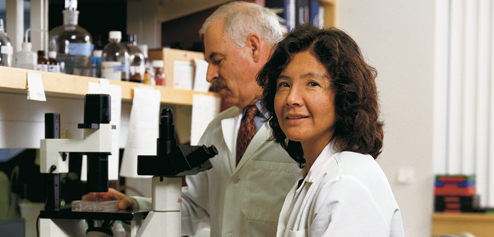Centers of Excellence: Support for Basic Science Research
The most traditional route to academic success in medicine has often been a career in basic science research, investigating the biological mechanisms of disease and aging in the hope that this will translate into innovative therapies, drugs, or diagnostic tests. Basic science researchers invent, discover, and develop the new knowledge that is needed to advance the field of geriatrics. They work primarily in laboratories and develop new knowledge from discoveries in the test tube, animal subjects, and eventually through clinical trials in humans.
The typical career path begins with the appropriate training and work in the lab of a mentor. The young researcher then applies for a career development award for his or her own independent research, followed by further grants to fund lab costs and ongoing research. Once a researcher becomes established, continued funding advances the research program and provides research apprenticeships for the next generation of medical students to perpetuate the recruitment and training of new basic science researchers.
For geriatric fellows interested in pursuing this career track, a major obstacle arises at the end of the first year of geriatric clinical fellowship. Just at the time when they need to prove their mettle to the NIH and other funding bodies that grant career development awards, funds become scarce. The Hartford Centers of Excellence assist these young scholars with salary support, lab space, equipment, computers, and mentoring by senior faculty.
Understanding Wound Healing and Tumor Growth
in Aging Tissue
“The University of Washington Center of Excellence was a very tangible force for me because they purchased my first microscope, a high-resolution photomicroscope, which I still have in my office today,” says May J. Reed, MD, Associate Professor, Division of Gerontology and Geriatric Medicine, University of Washington School of Medicine. “Some fellowships provide salary but they don’t pay for the tools to conduct research. Without my laboratory tools it would have been impossible for me to get started,” she says.
Dr. Reed chose the University of Washington for her geriatric fellowship because of the choices it offered for both clinical and research training. There she developed an interest in basic science, but not necessarily at the molecular level. “I wanted to do something that was directly applicable to some type of disease that I thought was important, so I chose to investigate wound healing in aging tissue,” she says.

May J. Reed, MD, with mentor Itamar Abrass, MD, University of Washington, Seattle, WA. Center of Excellence director Dr. Abrass provided the critical guidance and laboratory tools that helped Dr. Reed secure both a Beeson Career Development Award and NIH funding.
The research Dr. Reed conducts relates to the ability of older patients’ endothelial cells—which line the circulatory system and regulate blood pressure, among other functions—to form and repair blood vessels. Blood vessel formation is essential for wound healing and for repair of damaged heart muscle following a heart attack. With age, this function can become impaired for unknown reasons. At the same time, certain types of blood vessel formations are undesirable as they can be detrimental. For example, blood vessels can arise during tumor growth or cancer progression. These provide tumors with a source of blood, and therefore nourishment, which facilitates further tumor growth. Dr. Reed is investigating the mechanisms underlying both the beneficial and detrimental aspects of blood vessel formation in the elderly.
After her fellowship training, Dr. Reed received a Paul B. Beeson Career Development Award in Aging Research and subsequently received a Research Project (R01) award from NIH. She established an independent laboratory, has published findings in numerous journals and is now well established in her academic career.
“Where the Center of Excellence is so helpful is with the missing pieces—like equipment or gaps in funding—that are so problematic for young investigators,” she says. “If you show promise and a commitment to academics, the center is really there for you. It was there for me.”
